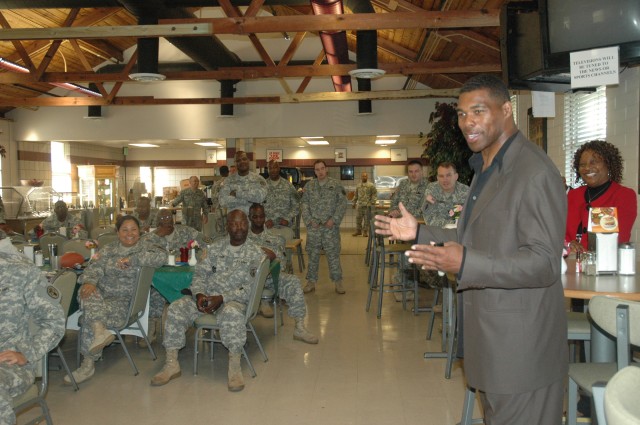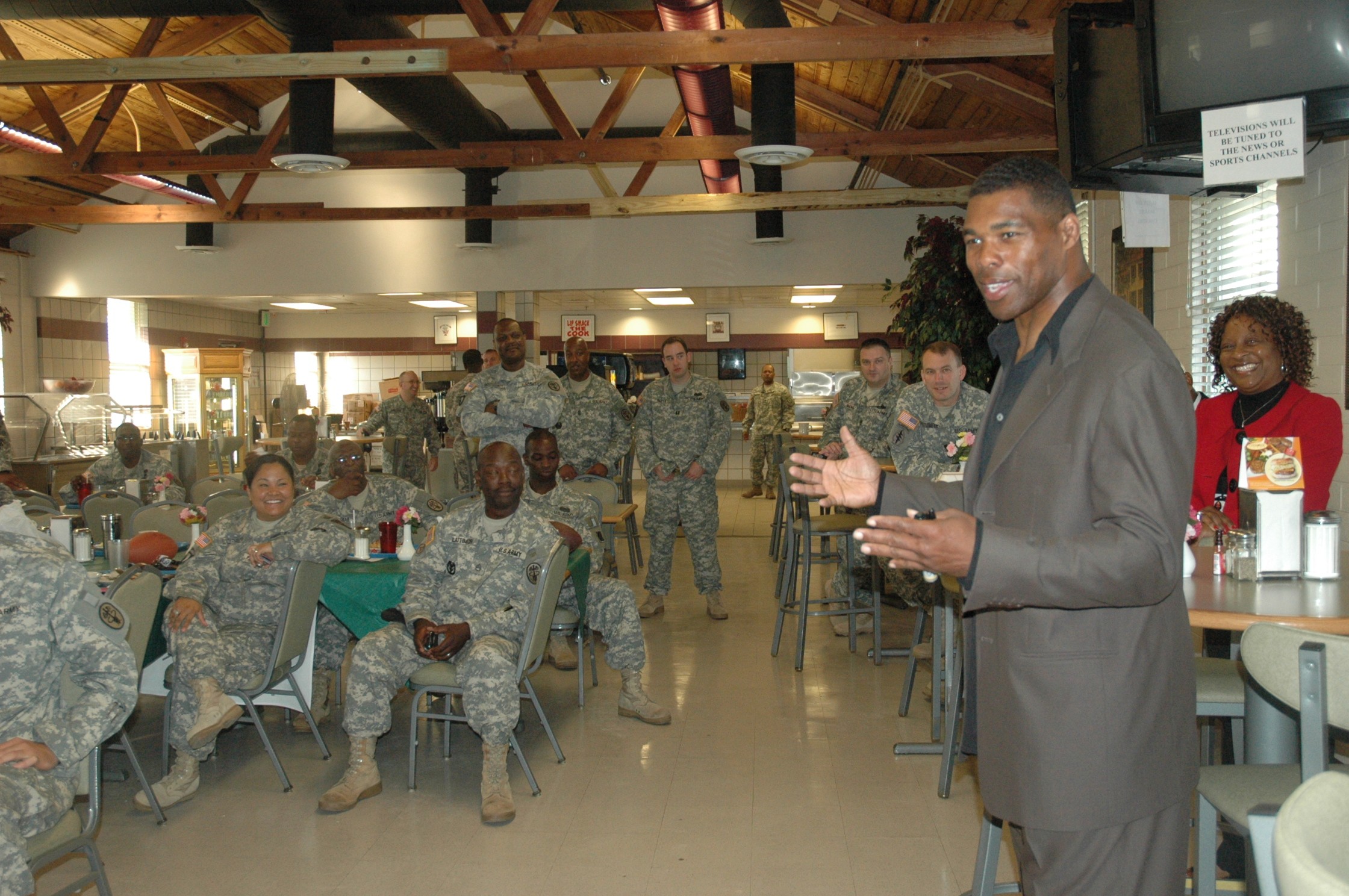
FORT STEWART, Ga. - "There's no shame in my game."
That was the message from Herschel Walker, University of Georgia legend and Heisman Trophy winner, to Soldiers of the Warrior Transition Battalion, May 13.
The Wrightsville, Ga. native is regarded as one of the top college running backs of all time. In 1999, he was selected to Sports Illustrated's NCAA Football All-Century Team and was selected as the third greatest player in college football history by ESPN. Walker, 48, had his jersey number "34" retired at the UGA.
In 2008, Walker wrote an autobiography, "Breaking Free," where he admitted that he had been diagnosed and treated for dissociative identity disorder, previously known as multiple personality disorder.
"I wasn't ashamed; I just knew something was wrong," Walker said to the crowd. "I took it upon myself to get help. I didn't like who I was; the things I was doing in life, I didn't like."
Walker, who said he doesn't drink alcohol and has never tried drugs, sought help after his playing career ended, and he felt himself spinning out of control.
"I had an anger problem; I didn't really hide, but I stayed away from people," Walker explained. "I had to be mentally tough to go get help. It wasn't a pride thing."
Walker grew up, in his words, chubby and with a speech impediment. In order to keep his peers from picking on him, he began practicing his speech and working out, doing up to 5,000 situps and pushups a day. By his sophomore year of high school, he was one of the most sought-after recruits in the nation. He chose the University of Georgia over Clemson University, but said that going to college at all was a tough decision for him.
"It was a tough decision for me to go to (the University of) Georgia or go into the military," he said, before saying that college won out by the flip of a coin - literally.
Despite his decision to chase his dreams on the gridiron, Walker said he has always had a spot in his heart for our men and women in uniform.
"I wanted to go into the military, but I think maybe God had a different plan for me, a different way to help," he said. "I hear people complaining about 'young people these days,' and I tell them that if they look at our military, you'll see our young people doing some amazing things."
It is that soft spot that led him to speaking to the Soldiers at Fort Stewart, as well as Soldiers around the country and the world.
"I think that it's inspirational that our Soldiers can see that, even if you're a pro athlete, you can have some of the same issues that some of them are struggling with," said Col. Paul Cordts, commander of Winn Army Community Hospital. "It gives them insight that it's important to seek help."
Mental issues and those who suffer from them have always been given a stigma, which is something that Walker is trying to change.
"If you're suffering, you don't have to 'man up;' you don't have to be ashamed," Walker said.
That message rang loud and clear to those in the audience.
"He was able to overcome the stigma to seek help, and he's probably more successful now than he ever has been," said Col. Cordts. "I hope that this will be an inspiration to our Soldiers."
Walker is not only a football legend; he is also founder and chief of one of the largest minority-owned meat processors in the nation, Renaissance Man Food Services, Inc., based in Savannah; he is a fifth-degree black belt in tae kwon do; he finished seventh in the 1992 Winter Olympics in the bobsled; he is 1-0 in his professional mixed martial arts career, which he took up at the age of 47; and he was on Donald Trump's "Celebrity Apprentice."
"What (his visit) does is it offers Soldiers the opportunity to see that others, even someone as well known as Herschel Walker, has gone through some similar issues and has overcome it," said Lt. Col. Bill Reitemeyer, WTB commander. "It's good to see someone who has done so much - won the Heisman, reached the pinnacle of his field - that he has gone through something some of them are goiig through, and that he's probably more successful today than he ever way, after going through all that."
For some Soldiers in the audience, the message hit close to home and also gave them reinforcement that seeking help isn't weak.
"Seeing him here today really reinforced the need to not just focus on the physical aspect of being a strong person, mentally you have to be ready to take on the challenges you're going to face day-to-day," said Sgt. Tracy J. Smith, WTB and 48th Infantry Brigade, who returned from Afghanistan in April and is with the WTB for hip injuries. "He talked a lot about bravery, and I've been privileged enough to witness some of the citizen-Soldiers in my brigade who are some of the bravest individuals I've ever encountered on a regular basis."
She acknowledged that seeing the bravery of her fellow Soldiers in Iraq and Afghanistan, and her work arranging memorials after their previous deployment to Iraq left some residual scars that even she didn't want to admit to.
"When we got back from Afghanistan [in April], I knew I had been dealing with some issues, nightmares and things of that nature... I never really talked about all the things that I saw or experienced," she said. "You realize you change, you're not as patient as you were, you don't want to be around people, and you remember that blood doesn't wash off your shoe. Sometimes you need to get a new pair. And that's what I'm doing - (in addition to physical rehabilitation) I'm reaching out and hoping to get a new outlook on how to deal with this."
"There are different types of heroes," Sgt. Smith continued. "The biggest hero is the one who's able to admit to a problem or a challenge and do something about it, and the bigger hero is the person next to them who can stand there and help prop them up as they work through it; the person who can stand next to that Soldier who needs a hand for the moment, and help them realize that you've got them, just like they want to make sure they've got you."
That message was reinforced by the football great.
"We all suffer; the problem is that we're too prideful to admit it," Walker said. "If you need help, get it - there's no shame in it."

Social Sharing